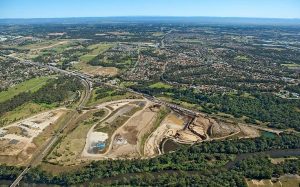
Commissioner Susan Dixon has reserved her decision but the residents behind the legal challenge in the Land and Environment Court against intermodal terminal proponents Cube have claimed a moral victory.
However they concede the best they can now hope for is the imposition of tough conditions on the project.
The three day court hearing finished last Friday with Cube beating a hasty retreat, according to Residents Against Intermodal Development Inc (RAID) vice president Jennifer French.
Ms French said the community “has finally had its say in the Land and Environment Court about the enormously destructive Moorebank Intermodal project that’s already under construction as Moorebank Logistics Park.
“Qube tried hard on two occasions prior to the case to keep us out of the courtroom, appealing on technical grounds relating to the Associations Act,’’ Ms French said.
But the Cube challenge failed, RAID had their day in court, and Ms French says it was a good three days in the Land and Environment Court before Commissioner Susan Dixon.
RAID, represented by the Environment Defenders Office (EDO) and by Mr Andrew Pickles SC, and with more than a dozen concerned residents in the public gallery, put forward two grounds to appeal against the approval of a key part of Moorebank Logistics Park.
The first was that rare and threatened plants, including the recently rediscovered Hibbertia fumana, a plant thought to be extinct for over 100 years, needed to be protected and its future assured.
The second was grounds of excessive noise from the development and its rail spur lines.

Residents also presented objections which included a traffic report informed by the long term work of local traffic modelling experts Paul and Narelle van den Bos.
Concerns about the presence of koalas travelling along the banks of the Georges River, the health of the Georges River under threat of chemical spills or tainted stormwater, the possibility of contaminants called PFOAs formerly used in firefighting practice, and others, were put to Commissioner Susan Dixon by the residents’ legal team.
Ms French said that he Commissioner assured residents present in Court that their concerns would be heard.
These objections were added to those of many residents who spoke at the earlier conciliation conference as part of the case.
Qube indicated to the Court that concessions would be made in respect to issues raised about the future of the rare and threatened plant species, and also made new concessions in respect to noise.
In light of these concessions and the joint expert evidence produced during the proceedings, RAID could no longer pursue an outright refusal of the approval, Ms French said.
